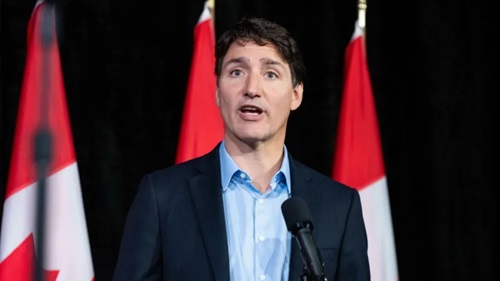Prime Minister Justin Trudeau has said he plans to lower the number of low-wage, temporary foreign workers and permanent residents being let into Canada.
Mr Trudeau made the announcement on Monday, on the second day of a cabinet retreat where his team is hammering out their autumn agenda.
It comes as Canada grapples with a rapidly growing population that economists say has put strain on housing and public services like healthcare.
The vast majority of Canada’s population growth last year - about 97% - was driven by immigration, according to the federal statistics.
Mr Trudeau and his government have been criticised for increasing immigration without bolstering services or housing construction.
At the same time, Canada’s unemployment rate has increased to 6.4% in the last two months, with an estimated 1.4 million people unemployed across the country.
In a press conference, Mr Trudeau said he is eyeing an overhaul to the temporary foreign workers programme because of changes to the labour market.
“It’s not fair to Canadians struggling to find a good job, and it’s not fair to those temporary foreign workers, some of whom are being mistreated and exploited,” he said.
The Temporary Foreign Worker programme allows employers in Canada to hire foreign nationals to fill temporary jobs when qualified Canadians are not available.
The programme has come under criticism by labour advocates and most recently the UN, which called it “a breeding ground for contemporary forms of slavery” in a report this month.
UN special rapporteur Tomoya Obokata, a professor of human rights law at the University of York in the UK, said he received reports of abuse and of workers being underpaid, among other complaints.
The programme’s use by employers has surged in recent years in industries ranging from agriculture to construction.
The rise is partly due to loosening programme restrictions to help businesses with labour shortages after the Covid pandemic.
Nearly 183,820 temporary foreign worker permits were granted in 2023, according to Employment and Social Development Canada (ESDC) - an 88% increase from 2019.
The ESDC criticised employers for using the programme to “circumvent hiring talented workers in Canada” in a Monday statement.
The changes will include refusing to process some work permits in areas where the unemployment rate is 6% or higher, with exceptions for seasonal food and agriculture jobs, construction and healthcare.
Overall, the plan will reduce the share of low-wage temporary foreign workers that employers can hire from 20% to 10% of their overall workforce.
The changes will come into effect on 26 September.
Earlier this year, the Canadian government indicated its intent to reduce the number of overall temporary residents for the first time in the country's history.
The cap would apply to foreign workers as well as international students and asylum seekers.
BBC





